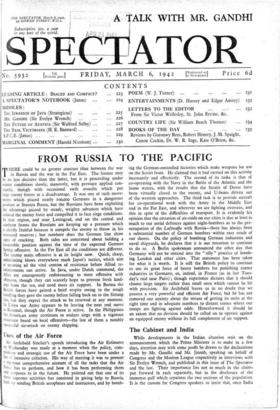Uses of the Air Force Sir Archibald Sinclair's speech introducing
the Air Estimates On Wednesday was made at a moment when the policy, com- position and strategic use of the Air Force have been under a ore r.!: intensive criticism. His way of meeting it was to present vigorous comprehensive account of all the tasks that the Air Force has to perform, and how it has been performing them and vroposes to in the future. He pointed out that one of its three supreme activities has consisted in giving help to Russia, both by sending British aeroplanes and instructors, and by bomb- ing the German-controlled factories which make weapons for use on the Soviet front. He claimed that it had carried on this activity incessantly and effectively. The second of its tasks is that of co-operating with the Navy in the Battle of the Atlantic and the home waters, with the results that the Straits of Dover have been virtually closed to the enemy, and U-boats driven out of the western approaches. The third task is to provide aircraft for co-operational work with the Army in the Middle East and in the Far East, and wherever we are fighting overseas, and this in spite of the difficulties of transport. It is evidently his opinion that the cessation of air-raids on our cities is duc at least as much to our aerial defences against night-bombers as to the pre- occupation of the Luftwaffe with Russia—there has always been a substantial number of German bombers within easy reach of our shores. On the policy of bombing German industries and naval shipyards, he declares that it is our intention to continue to do so. A Berlin spokesman announced the other day that Germany will not be enticed into the " silly " practice of bomb- ing London and other cities. That statement has been taken for what it is worth. It is still the British policy to continue to use its great force of heavy bombers for punishing enemy industries in Germany, or, indeed, in France (as in last Tues- day's raid near Paris) ; though experience dictates that it should choose large targets rather than small ones which cannot be hit with precision. Sir Archibald leaves us in no doubt that we possess a very powerful and efficient Air Force, but he has not removed our anxiety about the means of getting its units at the right time and in adequate numbers to distant scenes where our troops are fighting against odds. Henceforward it should be an axiom that no division should be called on to operate against an equipped enemy without its full complement of air support.


























